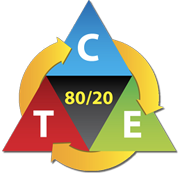 My mentor, Perry Marshall, uses a graphic called The Tactical Triangle to make a very important point about PPC advertising. You can read more about it on his website by clicking here. But I’ll give you the essence of it and add some of my own examples based on working with clients.
My mentor, Perry Marshall, uses a graphic called The Tactical Triangle to make a very important point about PPC advertising. You can read more about it on his website by clicking here. But I’ll give you the essence of it and add some of my own examples based on working with clients.
The reason Perry uses this particular graphic is to 1) show that there are three essential elements of a successful PPC campaign implementation and 2) achieving success requires using an iterative process of testing and improving the things that are most important, hence the 80/20 rule.
The three corners of the triangle are Traffic, Conversions and Economics. Unless the advertiser has an appreciation for the entire end-to-end online selling process, they won’t be able to make significant progress in their online business because Google Ads is only the Traffic piece. If the advertiser only focus on the mechanics of Google Ads, there is a chance the biggest opportunity may be overlooked. You see, Google Ads is about what happens, before the click, Conversion optimization is what happens after the click and none of this has any chance of working if the Economics don’t work.
Sometimes the biggest obstacles preventing an advertiser from being more successful with Google Ads, has little to do with their Google Ads account. There are lots of other factors that will determine the ultimate success of their Google Ads campaign. The real problem may be because:
- Their online business model is flawed. There isn’t enough profit in a product or service to justify PPC advertising. This is the Economics piece of the triangle.
- They don’t have an appreciation for the mindset of visitors from a search engine. They are cynical, skeptical and have very little patience.
- They don’t appreciate the inherent “shopping” nature of an online visitor and the associated (ROI) metrics.
- They haven’t taken the time to understand their online competitive standing.
- Their website, especially their landing page, is not optimized for visitors from search. The landing page and website are little more than an online brochure. It doesn’t SELL!
While you may see several competitors in a market and think you can compete and win, you may not know their unique business model. It’s possible that their entire ad spend and infrastructure could be paid for by another segment of their business. Or they may be willing to lose money in the market you are in, because they have a back-end product line with much higher profit margins.
When it comes to the performance of the advertiser’s Google Ads account, here are some of the most common issues I see:
- They don’t understand the psychology behind the search query or what’s going on inside the head of the user. A “User” is what Google calls anyone who uses a search engine or visits a website displaying ads.
- They focus too much on keywords and not enough on search queries.
- They don’t appreciate that every search query is a market unto itself.
- They don’t realize that every search query has a unique value to their business.
- They don’t have a viable bidding strategy. They let their ego get in the way or they have no plan whatsoever. I can’t tell you how many prospects I speak with that simply want to be in the top position”. Big mistake!
- They don’t understand the importance of keyword matching options or how to use them effectively.
- They aren’t using Conversion Tracking or web analytics so they don’t know what is working and what isn’t. They are flying blind!
- They don’t appreciate the difference between search advertising and display advertising.
- They don’t understand the significance of ad groups and how to construct them properly.
- They are intent on using certain Google Ads features, but don’t really understand how to use them properly.
And when it comes to the Economics, have you thought about…
- How many ad impressions will it take for you to get a click; your CTR? If your CTR is not at least 1%, you have a problem!
- What will you have to pay for a click; your Avg. CPC?
- How many clicks will you have to buy to get a lead; your CPA?
- How many leads will you need to make a sale; your cost per sale?
- What can you afford to spend to get a new customer?
- Do you know the lifetime value of a customer?
If you don’t have the answers to these questions, it will be difficult to truly optimize an Google Ads campaign.
Is any of this hitting home? If so, perhaps we should talk.

